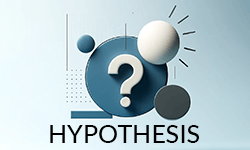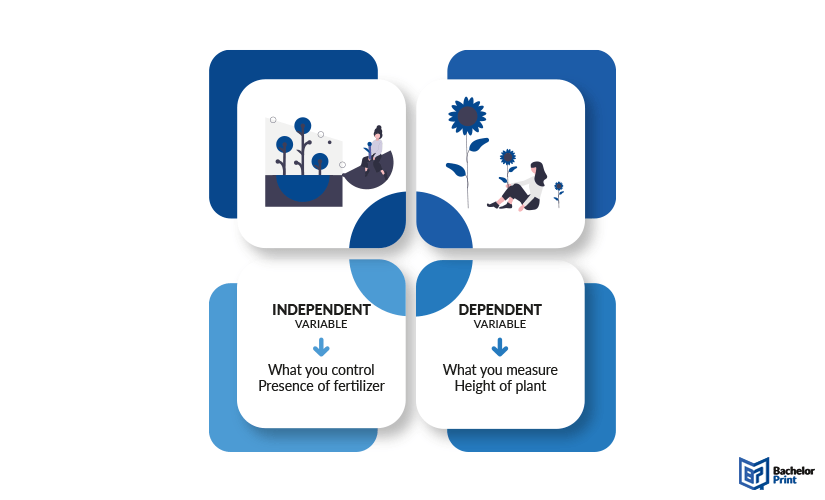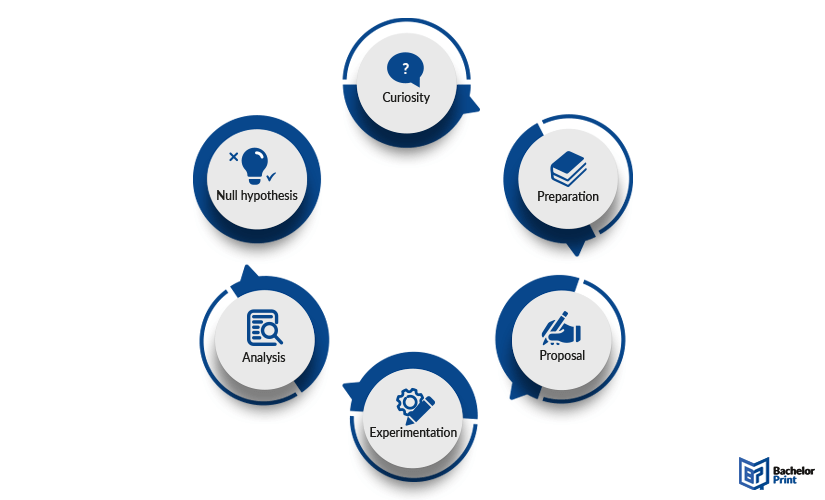
A hypothesis is a fundamental element in academic writing and research papers, offering a tentative explanation or prediction about relationships between variables. It is crafted based on initial observations or existing knowledge, guiding the direction of research. The development of a hypothesis involves observation, research, and the formulation of a testable statement, critical for structuring and advancing your study.
Definition: Hypothesis
A hypothesis, plural hypotheses, is a tentative explanation or prediction about a phenomenon or the relationship between variables that can be tested through observation and experimentation. According to Oxford Languages, the term hypothesis is “a supposition or proposed explanation made based on limited evidence as a starting point for further investigation” or “a proposition made as a basis for reasoning, without any assumption of its truth.” It’s an informed conjecture that is formulated based on existing knowledge, observations, and available evidence.
Well-constructed hypotheses are clear, specific, and testable, stating an expected outcome in a way that can be supported or refuted through empirical research. It often takes the form of a statement predicting a relationship between variables, such as cause and effect, and serves as a foundational element in the scientific method, guiding the direction of research and experimentation. Hypotheses are found across different subject areas, like:
- Astronomical hypotheses
- Authorship debates
- Biological hypotheses
- Documentary hypothesis
- Hypothetical documents
- Hypothetical impact events
- Hypothetical laws
- Linguistic theories and hypotheses
- Meteorological hypotheses
- Hypothetical objects
- Origin hypotheses of ethnic groups
- Hypothetical processes
- Hypothetical spacecraft
- Statistical hypothesis testing
- Hypothetical technology
Variables
There are typically two main types of variables: Independent vs. dependent variables.
- Independent variable: This is the variable that you change or control in an experiment to see how it affects the dependent variable. It’s the cause you’re investigating.
- Dependent variable: This is the variable you measure in the experiment and expect to change as a result of alterations to the independent variable. It’s the effect or outcome you’re observing.
Directionality is also part of a hypothesis; however, it is only an optional component. It specifies if the effect increases or decreases, showing the expected relationship between the variables.

Conceptual framework
A conceptual framework plays a crucial role in the development and contextualization of hypotheses within research. It acts as a scaffold that outlines the theoretical underpinnings and assumptions guiding the research, providing a structured approach to understanding the relationships between variables. The conceptual framework helps to:
- Identify and define key concepts
- Establish relationships
- Guide the research design
- Interpret findings
Etymology
The word comes from the Greek term “hupóthesis,” which means “foundation” or “supposition.” Let’s break it down into its separate parts:
- “hupo-“ means “under”
- “-thesis” means “placing” or “setting”
The etymology reflects the idea of setting down a foundation or a preliminary assumption that can be tested and built upon through research and observation.
Developing a hypothesis
Developing a prediction is an integral part of academic writing because it guides the direction of the study, helping to formulate questions, determine methodology, and analyse results. By stating what the writer expects to find, hypotheses lay the groundwork for a structured investigation, allowing for a systematic approach to gathering and interpreting data.
In this step, you’ll determine the research question to which you want the answer. The question should be concise, specific, and researchable based on observations or existing knowledge.
The results you expect to get should be supported by the information already known about the topic. This includes reviewing existing literature, studies, and data. Use previous research to make an educated guess as to what your research will find. Journals and reports are also good places to find information. This will help you figure out your variables and what direction your research will take, which is the overriding principle of how to write a hypothesis. In this step, you may create a conceptual framework.
Based on your research, you propose a tentative explanation or prediction that addresses your question. This should be specific and testable. Now that you have a bit of research under your belt, you can write the answer you expect to find when you conduct your research. Like the question you pose in your hypothesis, this statement should be clear, concise, and to the point.
In this step, you’ll outline why your question is researchable. Design and experiment to test whether the data supports your hypothesis. This often involves data collection through observations or experiments, discussing your variables, who or what you’ll be studying, and what you expect to happen with experimentation or analysis.
Make sure the wording of your hypothesis aligns with your purpose. This could be an “if-then” statement. It could also use a correlation between the variables. It might be what differences you expect to find. After the experiment, analyse the collected data to see if it supports your hypothesis. This step may involve statistical analysis to determine the significance of your findings.
The last step involves formulating a null hypothesis (H₀), which is a statement that there is no effect or no difference, and it serves as a default or neutral position that researchers aim to test against the alternative hypothesis (H₁).
The null hypothesis is designed to be tested and possibly rejected in favour of the alternative hypothesis. It’s a critical component because it allows for a precise and statistical examination of the expected relationship between variables.

Examples
There are many ways to address how to write a hypothesis, but the process isn’t always easy. Sometimes seeing a research example is a good way to figure out what direction you want to take. Below are some examples that can help guide you.
| Research question | Alternative hypothesis | Null hypothesis |
| Does drinking green tea daily improve concentration levels in adults? | Adults who drink green tea daily experience an improvement in their concentration levels compared to those who do not drink green tea daily. | Drinking green tea daily has no effect on the concentration levels of adults compared to those who do not drink green tea daily. |
| Does exposure to natural light during the workday affect the productivity of office workers? | Office workers exposed to natural light during the workday show higher productivity levels than those who work in artificial light only. | Office workers exposed to natural light during the workday do not show higher productivity levels than those who work in artificial light only. |
| Does regular physical exercise lead to lower stress levels in university students? | College students who engage in regular physical exercise experience lower stress levels than those who do not engage in regular exercise. | Regular physical exercise has no effect on the stress levels of university students compared to those who do not exercise regularly. |
Null and alternative hypothesis
The null and alternative hypotheses are fundamental concepts in hypothesis testing, a core aspect of statistical analysis used to infer the relationship between variables.
The alternative hypothesis (H₁) proposes that there is a significant difference or relationship between the variables. The researcher aims to support it, suggesting that the observed effects are not due to chance but are real and can be attributed to the specified conditions or treatments. Below, you will find examples.
The null hypothesis (H₀) asserts that there is no significant difference or relationship between the variables being studied. It represents the default position that any observed effects are due to chance. The purpose of hypothesis testing is often to reject or fail to reject the null hypothesis.
Statistical hypothesis testing
Statistical hypothesis testing is a scientific method used in statistics to decide whether there is enough evidence in a sample of data to infer that a certain condition is true for the entire population. It starts with formulating two hypotheses: the null hypothesis (H₀), which suggests no effect or no difference, and the alternative hypothesis (H₁ or Ha), which suggests a significant effect or difference. Researchers then use statistical tests to calculate a p-value, which indicates the probability of observing the data if the null hypothesis is true. If the p-value is less than a predefined significance level (commonly 0.05), the null hypothesis is rejected in favour of the alternative hypothesis, suggesting the observed effect is statistically significant. This process helps researchers make informed conclusions based on sample data, though it’s important to consider, it only indicates the null hypothesis is unlikely given the data.
Scientific hypothesis
A scientific hypothesis is a specific, testable prediction about what will happen under certain conditions, based on a combination of existing knowledge, observations, and an understanding of scientific principles. It suggests a possible explanation for a phenomenon or a predicted relationship between variables that researchers aim to explore through empirical investigation.
When formulating a scientific hypothesis, researchers should consider the following:
- Empirical testability: Allows it to be tested through observation or experimentation.
- Clarity and specificity: Should specify the expected relationship between variables.
- Consistency: Must be consistent with existing scientific theories and knowledge.
- Simplicity: If two hypotheses explain the data equally well, the simpler one is preferred.
- Falsifiability: Evidence can refute a hypothesis, proving it wrong.
- ✓ 3D live preview of your individual configuration
- ✓ Free express delivery for every single purchase
- ✓ Top-notch bindings with customised embossing

Hypotheses as concepts & measurements
In the realm of scientific research, hypotheses serve as bridges between abstract concepts and tangible measurements, enabling researchers to rigorously test theories and explore the laws of nature. At the core of this process lies the differentiation between primitive and derivative hypotheses, each playing a vital role in the systematic enquiry into natural phenomena.
Primitive hypotheses are foundational assumptions or propositions taken as given within a particular research context. These hypotheses are often broader in scope, serving as the bedrock upon which more specific, testable propositions are built. They usually stem from established theories or widespread observations, acting as the initial building blocks in the formulation of a conceptual framework.
Derivative Hypotheses, on the other hand, are those that are directly formulated from primitive hypotheses. They are more specific, testable statements that predict outcomes based on the foundational assumptions of the primitive hypotheses. Derivative hypotheses are crucial for the empirical testing of theories, as they translate broad theoretical concepts into specific, measurable predictions.
Levels for testing hypotheses reflect the complexity and hierarchical structuring of research questions, ranging from broad, theoretical propositions to specific, empirical inquiries. This gradation ensures that hypotheses can be systematically tested across different layers of abstraction, from verifying fundamental laws of nature to assessing the applicability of theories in specific contexts. Levels for testing hypotheses often range from very broad, theoretical inquiries to more specific, empirical investigations.
The testing of hypotheses is a methodical process that involves comparing empirical data against predictions made by derivative hypotheses. This critical step allows researchers to assess the validity of their hypotheses, refine theoretical models, and contribute to the body of scientific knowledge. Successful hypothesis testing typically relies on sophisticated statistical analysis, providing a quantifiable measure of the extent to which the data supports or refutes the proposed hypotheses.
Ultimately, the interplay between hypotheses as concepts and their empirical measurements is fundamental to advancing our understanding of the law of nature. Through the meticulous testing of hypotheses, science progresses from abstract theories to concrete understanding, uncovering the principles that govern our world. This iterative process of formulation, testing, and refinement is essential for the continuous evolution of scientific knowledge, driving forward the quest for truths of the law of nature.
FAQs
Your hypothesis is a statement that lets the reader of your paper know what your research question is and what you expect the answer to be.
A well-written hypothesis should include:
- The question you want to answer with your research
- Information about what you already know about the topic
- A clear sentence that says what you expect your results to show
- The variables involved in the research
- The group that is part of the research
- The outcome you think you’ll see
Here’s an example:
If people sleep less than seven hours a night, then they will feel more tired during the day compared to those who sleep more than seven hours.
The components are:
- Independent variable
- Dependent variable
- Directionality